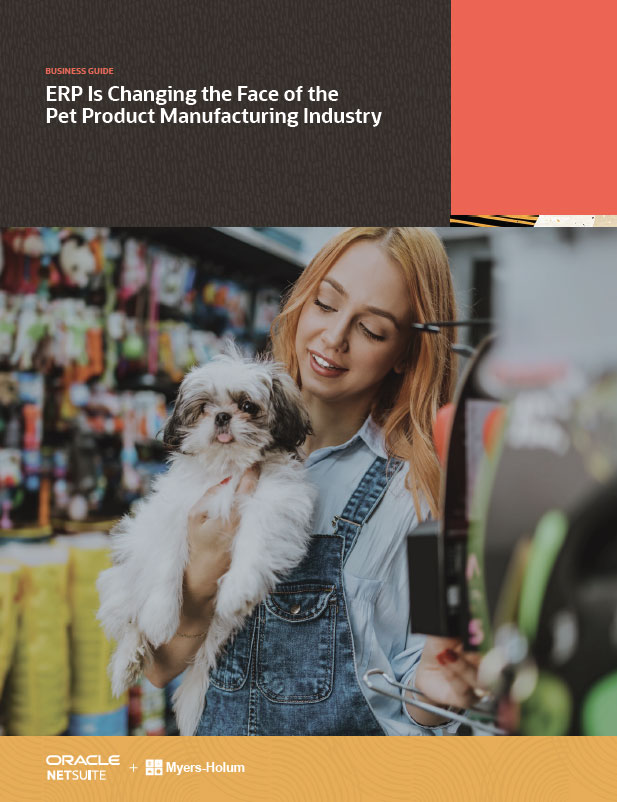
How ERP Changes the Face of the Pet Product Manufacturing Industry
Published on by Oracle NetSuite & Myers-Holum
How ERP Changes the Face of the Pet Product Manufacturing Industry
This article excerpt is from the Oracle NetSuite and Myers-Holum guide that is available for download at the end of this article.
By combining a leading cloud ERP platform with industry-built customizations, pet product manufacturers are eliminating manual processes, saving money and using real-time reporting for better decision-making.
The pet supply industry is booming in the US. In 2021, pet owners spent $103.6 billion for food, treats and supplies, with pet food comprising the biggest portion. In 2022, pet food sales are expected to increase by 5.8% thanks to the average $329 million to $442 million that owners spend on it annually.
As the pet food industry expands, the way owners buy products is also changing. During the global COVID-19 pandemic, for example, online pet food purchases and subscription signups reached all-time highs, with ecommerce gaining ground over more traditional in-store purchases. The trend is expected to continue in the years to come.
The industry’s rapid uptick and shift to ecommerce presents new challenges for pet food manufacturers, who are also managing external issues like ongoing supply chain disruptions and persistent labor shortages. To address these issues, many of them are reviewing their aging, legacy business systems and looking for unified cloud-based technology platforms that support better operational agility and efficiency.
In this article, we look at the challenges and opportunities that online native pet supplies companies are facing right now, and explain how a leading cloud ERP system supported by industry-specific customizations can help companies save time and money, gain access to accurate reporting and improve their supplier and customer relationships.
You Can’t Manage High-Growth on Spreadsheets
Operating in a high-growth industry that’s shifting to omnichannel, customers expect to pick up where they left off from one channel to another. Pet food manufacturers need robust business systems that support their expanding, multifaceted operations and line up with customer expectations.
Relying on both B2B and direct to consumer (D2C) channels, these manufacturers average anywhere from $50 million to $500 million in annual sales. To run their operations, most use on-premises legacy systems from Sage or Microsoft, basic accounting software like QuickBooks or a proprietary solution. Many of these manufacturers also rely heavily on spreadsheets and manual processes because information cannot be shared across these systems.
This approach presents significant challenges for pet food manufacturers that must balance growing demand for their goods at a time when labor constraints, supply chain issues and shifting consumer habits are creating a “perfect storm” of challenges. Without a unified Enterprise Resource Planning (ERP) platform in place, manufacturers lack real-time data that supports good inventory management, forecasting and supply chain planning.
Forced to pore over disparate spreadsheets, companies can quickly find themselves falling behind competitors who have more robust, integrated solutions in place.
For distribution, pet food manufacturers typically work with third-party logistics (3PL) providers to get their products to market. These providers usually have their own technology platforms for tracking shipment data and delivery information. When those systems aren’t integrated with the manufacturer’s own legacy solutions, basic functions like managing inventory and pinpointing delivery times require phone calls, emails and other manual checkpoints.

The challenges don’t end there. End-to-end supply chain visibility translates into better performance and customer service. Pet food manufacturers relying on outdated systems lack the tools needed to improve their operational performance and profitability.
“We recently worked with a pet food manufacturer that was storing data on spreadsheets and using pivot tables to understand specific performance data metrics,” said Dominic Ryba, Delivery Manager at Myers-Holum, Inc., a NetSuite Alliance Partner. “Then, that information was used to drive decisionmaking at a leadership level.”
Another pet food manufacturer that has partnered with Myers-Holum to implement NetSuite was creating journal entries for each individual sales order and then using those entries to adjust the cost of goods sold (COGS) in QuickBooks. This was a time-consuming process that required a great deal of manual effort.
“As the manufacturer’s business expanded, its efforts to maintain operational effectiveness and reporting accuracy significantly increased alongside its company growth,” Ryba explained. “In the end, the company’s decision to implement NetSuite was based on increasing employee frustrations, incorrect data analytics and overall productivity issues that it was trying to manage with its aging, disparate systems.”
Minding the Details
Any company that’s making or marketing pet food must follow guidelines similar to that of human food, with units of measure being one of several standards that companies must adhere to and use in their operations. For pet foods, net contents are generally expressed in terms of weight or count for dry products and fluid measures for liquids. When manufacturing these products, companies must incorporate the correct units of measure into all work orders and provide that information to suppliers and customers.
"There are many data elements that manufacturers use when it comes to ordering, building and selling,” said Ryba. “Most companies that manufacture dog food need to use multiple units of measure interchangeably depending on the vendor, the customer and the item type. For example, a company could procure a product in either pounds, cases or packs depending on an vendor’s procuring system. Each vendor can sell the same item in different units of measure. This means the manufacturer winds up with more and more one-offs based on those vendor-specific needs. The more variables there are, the more administrative time is required to maintain integrity across those business relationships.”
To help its customers solve these and other challenges, Myers-Holum provides a broad range of bundled customizations that enhance NetSuite’s native functionality. The partner also uses a specific project implementation methodology that includes a full discovery phase: understanding the customer’s current state, pain points and goals, followed by building out, testing and validation of the ERP solution.
“It’s a fairly in-depth process and something we use for all of our large-scale implementation processes,” said Ryba. “Myers-Holum has also developed a similar implementation methodology geared more toward smaller projects that may not require a lengthy, in-depth approach.”
BUSINESS GUIDE
ERP Is Changing the Face of the Pet Product Manufacturing Industry
Download Business Guide





